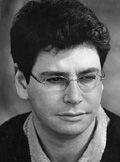
Josh Corey, Eric Selinger and Mark Scroggins have been blogging up a storm about difficulty and pleasure in poetry (and, as always seems to be the case when difficult art comes up, ethics and politics have reared their sober heads). There's some interesting stuff going on, but I'm not at all sure there's a conclusion available, and some of the terms of the debate seem a bit squishy. For what it's worth, here's my take...
 Josh began by writing about the different kinds of pleasure he gets from reading different kinds of texts. Long story short, he makes a distinction between the relatively easy and, to his mind, somewhat passive pleasures to be had from reading mainstream fiction (Richard Russo's novel Straight Man being his primary example) and the thorny, effortful pleasures to be had from reading experimental poetry. From the way he talks about this second class of texts, he seems to be thinking mostly of Language Poetry. And he uses one Language Poet's categories for his discussion, taking Ron Silliman's terms "absorptive" and "antiabsorptive" to describe the experience of reading mainstream fiction and alt-poetry, respectively. (For those of you who've gone a little foggy on Silliman's terms, the breakdown is like this: for Silliman, absorptive texts give you language that you don't notice as such, and allow you to settle back and watch a mental movie. In contrast, the anti-absorptive text throws a bit of a linguistic monkey wrench into the movie machinery, stopping the show — we have to confront the language in its unassimilability to our ordinary reading processes). Josh says he likes both kinds of reading for different reasons (the absorptive text, he says, will get you through a long flight better than the anti-absorptive text, and as a guy who suffered through a long wait in the Rejkjavic airport with nothing but Gulliver's Travels, a Toblerone and a bottle of duty-free scotch to sustain me, I feel Josh on this one). But Josh sort of worries about the non-hierarchical nature of his pleasures. Aren't the difficult texts somehow better for us, he wonders?
Josh began by writing about the different kinds of pleasure he gets from reading different kinds of texts. Long story short, he makes a distinction between the relatively easy and, to his mind, somewhat passive pleasures to be had from reading mainstream fiction (Richard Russo's novel Straight Man being his primary example) and the thorny, effortful pleasures to be had from reading experimental poetry. From the way he talks about this second class of texts, he seems to be thinking mostly of Language Poetry. And he uses one Language Poet's categories for his discussion, taking Ron Silliman's terms "absorptive" and "antiabsorptive" to describe the experience of reading mainstream fiction and alt-poetry, respectively. (For those of you who've gone a little foggy on Silliman's terms, the breakdown is like this: for Silliman, absorptive texts give you language that you don't notice as such, and allow you to settle back and watch a mental movie. In contrast, the anti-absorptive text throws a bit of a linguistic monkey wrench into the movie machinery, stopping the show — we have to confront the language in its unassimilability to our ordinary reading processes). Josh says he likes both kinds of reading for different reasons (the absorptive text, he says, will get you through a long flight better than the anti-absorptive text, and as a guy who suffered through a long wait in the Rejkjavic airport with nothing but Gulliver's Travels, a Toblerone and a bottle of duty-free scotch to sustain me, I feel Josh on this one). But Josh sort of worries about the non-hierarchical nature of his pleasures. Aren't the difficult texts somehow better for us, he wonders? Eric Selinger jumps in with his answer to this last question: a resounding No. In Eric's view, it's all good: straightforward texts, difficult texts, what have ya. He rejects the kind of moral hierarchy that Josh raises as a possibility. He rejects the dichotomy of purely-absorptive and purely-antiabsorptive texts (yet another one of Silliman's dichotomies crumbles under scrutiny). Eric also points out that the difficulty of a text is subjective, not objective: the mainstream fiction that Josh breezes through with ease is easy to him beacuse he understands the conventions well. Other people might struggle with it (the way I do when reading French or Swedish, where my skills are taxed by Le Monde and the Sydsvenska Dagbladet, let alone the poetry of Mallarme or Jesper Svenbro). This last point raises another idea (one Eric doesn't explore much): that something like Language Poetry isn't necessarily "difficult" to its primary readership: other language poets and the profs who swarm around them. (I try to follow this idea up a bit in a review of Allen Fisher's Gravity, among other books, in a soon-to-be-released issue of Pleiades: check the lit-journal section of your local supermarket for copies).
Eric Selinger jumps in with his answer to this last question: a resounding No. In Eric's view, it's all good: straightforward texts, difficult texts, what have ya. He rejects the kind of moral hierarchy that Josh raises as a possibility. He rejects the dichotomy of purely-absorptive and purely-antiabsorptive texts (yet another one of Silliman's dichotomies crumbles under scrutiny). Eric also points out that the difficulty of a text is subjective, not objective: the mainstream fiction that Josh breezes through with ease is easy to him beacuse he understands the conventions well. Other people might struggle with it (the way I do when reading French or Swedish, where my skills are taxed by Le Monde and the Sydsvenska Dagbladet, let alone the poetry of Mallarme or Jesper Svenbro). This last point raises another idea (one Eric doesn't explore much): that something like Language Poetry isn't necessarily "difficult" to its primary readership: other language poets and the profs who swarm around them. (I try to follow this idea up a bit in a review of Allen Fisher's Gravity, among other books, in a soon-to-be-released issue of Pleiades: check the lit-journal section of your local supermarket for copies). Enter Mark Scroggins. After giving a summary of the debate much like the one I'm giving now, he takes sides, saying that he, like Josh, feels that there is a sense in which the difficult, anti-absoprtive text is better for us — if not in terms of pleasure, then morally or ethically or politically. Mark presents this as a gut feeling, rather than an argument, and admits that the various arguments for this position that he's encountered don't ever satisfy him for long. But he does give us some sense of what lies behind his gut reaction (and no, it isn't the volcanic south Florida hot sauce he uses as a metaphor for challenging reading): he tells us that the difficult, anti-absorptive text is connected to our ability to recognize the Other as Other (with all Lacanian capitalizations intact). The otherness of unabsorbable language becomes a kind of homology for the otherness of the Other, and our recognition of it somehow makes us, you know, better.
Enter Mark Scroggins. After giving a summary of the debate much like the one I'm giving now, he takes sides, saying that he, like Josh, feels that there is a sense in which the difficult, anti-absoprtive text is better for us — if not in terms of pleasure, then morally or ethically or politically. Mark presents this as a gut feeling, rather than an argument, and admits that the various arguments for this position that he's encountered don't ever satisfy him for long. But he does give us some sense of what lies behind his gut reaction (and no, it isn't the volcanic south Florida hot sauce he uses as a metaphor for challenging reading): he tells us that the difficult, anti-absorptive text is connected to our ability to recognize the Other as Other (with all Lacanian capitalizations intact). The otherness of unabsorbable language becomes a kind of homology for the otherness of the Other, and our recognition of it somehow makes us, you know, better.

Here are some assumptions that creep in here and there at the edges of this (interesting, stimulating, end-of-semester brightening) discussion. They are, I think, questionable, if by questionable we mean wrong.
Difficult = Anti-Absorptive = Ethical
Both of the equals signs in the above equation are problematic.
1. Difficult = Anti-Absorptive
Okay, so this is problematic in two ways. Firstly, there's the point (implicit, I think, in Eric's piece) that difficulty is something experienced by the reading subject, rather than inherent in the textual object. What's difficult for me may be easy for you, and vice-versa. This goes for all schools of "difficult" poetry. I mean, the formidably difficult works of Modernism have become pretty straightforward to thousands and thousands of readers over time, as we (I fear that is the professorial "we") have internalized the linguistic conventions with which they were written.
Secondly, the equation of "difficult text" and "text that defies ordinary conventions of usage" leaves out a whole range of difficulties, from allusions to matters of sympathy-with-the-devil (I've harped on about this so much before, I feel I ought to leave it alone for a while). (It is also a part of the Pleiades piece I mentioned).
2. Anti-Absorptive = Ethical
Man, this idea just won't die. I mean, the idea is better than a century old, in one version or another (not to keep pointing to my own stuff, but I've got an essay on this coming out next year sometime). There have been all kinds of versions of it, from the Surrealist notion that their particular form of strangeness was fundamental to any true political revolution, through Brecht's revolutionary hopes for the baring of the device, and on to the more modest claims of the Langpo and post-langpo types, who so often to equate linguistic rupture and the like either with resistance to commodification (see Charles Bernstein's "The Value of Sulfur for a brief and distilled version of this argument) to the notion that it defamiliarizes our habitual perceptions of the world and therefore opens us up to the Other (the position dear to Mark's heart).
I can see two problems with this equation. Eric points to the first when he says, a propos Mark's statement that his instincts point in the direction of this position, "show me the money." We'd need actual evidence that this stuff works, and such evidence is on the threadbare side.
The second problem is this: it is wrong to imply that only the defamiliarizations of anti-absorptive art can truly bring us into relation with the Other. I mean, Mark's protestations that the Russian Formalists had a stake in the avant-garde notwithstanding, we would do well to remember that Victor Schlovsky (the man who gave us the concept of defamiliarization in his essay "Art as Technique") used Tolstoy for all (or was it almost all? I'd have to check, and the book is way over there, behind the stack of essays I'm supposedly grading right now) of his examples of defamiliarization. And one could point to plenty of entirely absorptive, formally conventional works that have gone a long way toward bringing people like me into contact with cultural otherness. Chinua Achebe's Things Fall Apart, for example, gave me rich sense of the otherness of Nigerian history. Ditto Thomas Hardy for English country life of the last century. Ditto Charlotte Bronte for the contradictions of feminine desire in a patriarchy. I don't think I came away from anything by Lyn Hejinian or Catherine Daly with this much of a sense of otherness. (Josh points to a sharp essay on science fiction and experimental poetry with some bearing on all this). Which is not to say I don't find a huge value in anti-absorptive texts: I just don't think the window-to-otherness argument is very tenable.
1. Hierarchy and telos. I can't quite be down with Eric's "it's all good, to hell with the hierarchies" position (if that is in fact where he's at). I think it is inevitable that we have hierarchies for different kinds of pleasure -- every time we put one thing rather than another in our Netflix queue, we make an implicitly hierarchical decision. The trick is not to seperate hierarchy from telos: when we ask "is this better than that?" we're really asking "is this better than that for some particular end or purpose." Josh began with a kind of acknowledgement of this when he praised the "it will get through a long flight better than a bucket of Bernstein" virtues of the Aubrey/Maturin novels of Patrick O'Brian. But by the end of his post he'd been consumed by doubts, and seemed to wonder if there wasn't an absolute (rather than telos-driven) hierarchy, in which the anti-absorptive was absolutely (rather than relatively-with-regard-to-a-particular-telos) better. Gotta have the telos if you have the hierarchy.
2. We aren't really talking much about pleasure any more. We've gone into ethics. What kind of pleasure does anti-absorptive writing actually give, and how is it distinctive from other kinds of reading pleasure (if, in fact, it is different) is a question we haven't done much to answer, although Eric gestures toward this kind of thing when he starts asking about Aristotelian eudaimonia in contradistinction to sensory pleasure (though the sensory, bodily pleasure of reading is generally minimal — way, way, way below neck massage, say, and not anywhere near the cold beer/hot day nexus).
3. We need some actual data. I know all of the soulfull-eyed, soft-handed humanists of the world blanche at the those two syllables, for I am of that tribe myself, and nurtured in its non-empirical ways. But while my heart yearns for the kind of humanistic interrogation of pleasure Eric outlines (he calls for a discussion invoking "Barthes, Adorno, Freud, Lacan, even Aristotle"), my head tells me we'd do better to have some new information to work with, of a kind that can be measured with actual scientific instruments. You may snicker, oh my fellow humanists, but researchers have been doing interesting things with neural imaging and the humanities — there's been, for example, some interesting work on what happens in various parts of the brain during meditation and what the subjects of the experiments describe as religious experiences (long story short: when people report feeling a mystical union with the universe during Bhuddist meditation, it seems that they've managed to reduce the flow of blood to the part of the brain responsible for showing us our location in time and space). I know the Archambeau Institute for the Neurobiology of Aesthetic Experience isn't going to come into being in my neck of the liberal arts, but I think some serious research into what actually happens in the brains of different readers as they have different kinds of textual and aesthetic experiences would be an important beginning to getting beyond the "my favortie kind of art happens to be good for you and will open your mind to the Other" assertion as a justification for experimental art and writing. Go Big Science!
4. I'm not through reading it yet, but it looks like Simon DeDeo's new essay on anarchist poetics may have some bearing on all of this. So I'm off to read the rest of it now — what better way to put off reading that pile of essays?